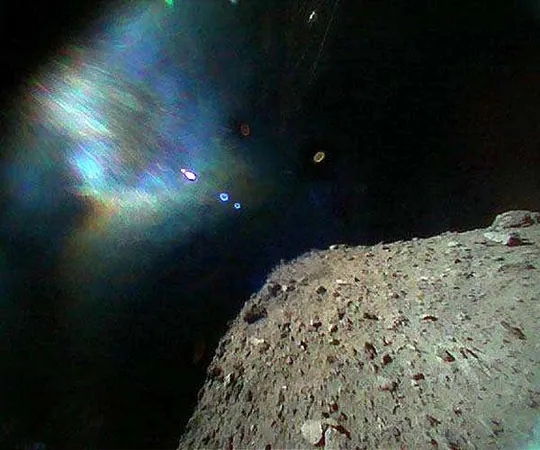
Shocking New Findings Rewrite the Origins of Asteroid Ryugu!
2024-09-29
Author: Nur
Astrophysicists are shaking up the scientific community with groundbreaking research on the origins of asteroid Ryugu, which might not be as far-flung as we once believed! The Hayabusa 2 mission, which triumphantly returned samples from Ryugu to Earth in December 2020, has opened a Pandora's box of new insights that challenge long-held theories.
For years, scientists believed that Ryugu, a carbon-rich near-Earth asteroid, originated far beyond the orbit of Saturn. However, meticulous investigations led by a team from the Max Planck Institute for Solar System Research (MPS) in Germany have thrown this assumption into question. Instead of originating from the chilly outer Solar System, Ryugu may have formed much closer to the immense gravitational pull of Jupiter!
At first, researchers focused on the metal isotopes within Ryugu’s samples collected from the Hayabusa 2 probe. Their comparative studies with various carbonaceous chondrite meteorites—specifically the rare CI chondrites—revealed unexpected results. Not only did these tests confirm the close relationship between Ryugu and CI chondrites, but they also suggested the presence of a mysterious fourth component in their formation—tiny iron-nickel grains that were previously overlooked.
Lead researcher Fridolin Spitzer expressed astonishment at these findings, stating, “Completely different processes must have been at work in the formation of Ryugu and the CI chondrites compared to other carbonaceous chondrites.” This pivotal research indicates that these materials may have spent less time than suspected in the colder regions of the Solar System.
The implications of this discovery could be monumental! Researchers believe that the physical conditions around Jupiter and the nature of materials in the protoplanetary disk influenced the formation of not just Ryugu but also other similar carbon-rich bodies. This challenges the traditional narrative and suggests we may have to rethink how we view the early Solar System's architecture.
Dr. Christoph Burkhard, another prominent figure behind the study, remarked, “The results surprised us very much. We had to completely rethink not only Ryugu's origin but also that of all CI chondrites.” This thrilling discovery thus propels our understanding of asteroid formation and opens new avenues for research into the Solar System's early history.
Could this transformative understanding of Ryugu lead us deeper into unraveling the secrets of our cosmic neighborhood? As scientists continue to analyze these findings, the excitement in the scientific community reaches a fever pitch! Stay tuned for more updates as we delve exactly where Ryugu comes from and what it means for our understanding of the origins of our Solar System!



 Brasil (PT)
Brasil (PT)
 Canada (EN)
Canada (EN)
 Chile (ES)
Chile (ES)
 España (ES)
España (ES)
 France (FR)
France (FR)
 Hong Kong (EN)
Hong Kong (EN)
 Italia (IT)
Italia (IT)
 日本 (JA)
日本 (JA)
 Magyarország (HU)
Magyarország (HU)
 Norge (NO)
Norge (NO)
 Polska (PL)
Polska (PL)
 Schweiz (DE)
Schweiz (DE)
 Singapore (EN)
Singapore (EN)
 Sverige (SV)
Sverige (SV)
 Suomi (FI)
Suomi (FI)
 Türkiye (TR)
Türkiye (TR)